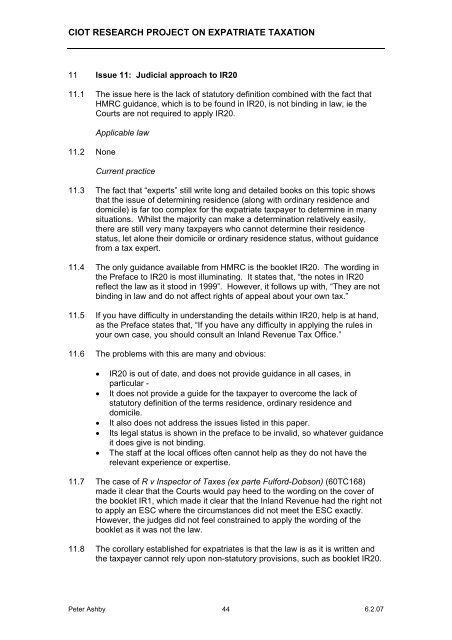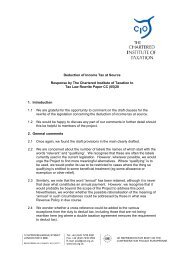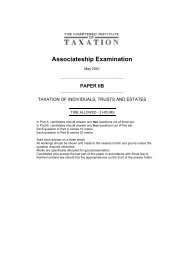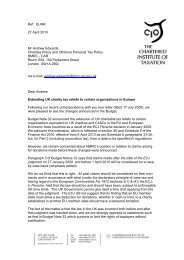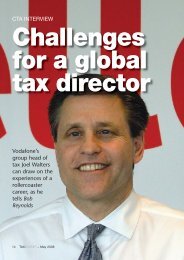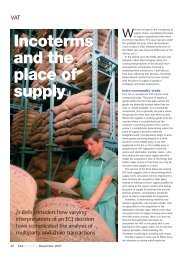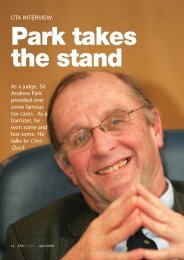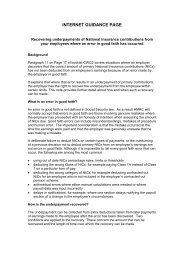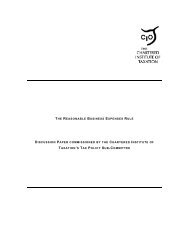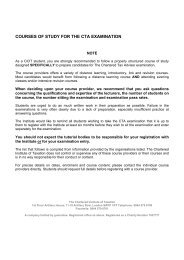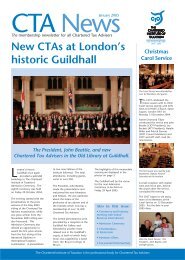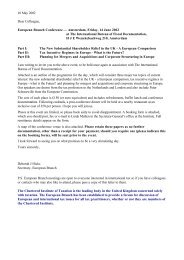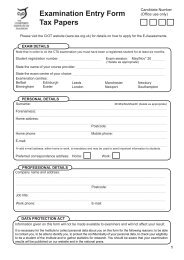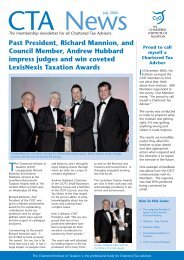Expatriate taxation - CIOT - The Chartered Institute of Taxation
Expatriate taxation - CIOT - The Chartered Institute of Taxation
Expatriate taxation - CIOT - The Chartered Institute of Taxation
You also want an ePaper? Increase the reach of your titles
YUMPU automatically turns print PDFs into web optimized ePapers that Google loves.
<strong>CIOT</strong> RESEARCH PROJECT ON EXPATRIATE TAXATION<br />
11 Issue 11: Judicial approach to IR20<br />
11.1 <strong>The</strong> issue here is the lack <strong>of</strong> statutory definition combined with the fact that<br />
HMRC guidance, which is to be found in IR20, is not binding in law, ie the<br />
Courts are not required to apply IR20.<br />
11.2 None<br />
Applicable law<br />
Current practice<br />
11.3 <strong>The</strong> fact that “experts” still write long and detailed books on this topic shows<br />
that the issue <strong>of</strong> determining residence (along with ordinary residence and<br />
domicile) is far too complex for the expatriate taxpayer to determine in many<br />
situations. Whilst the majority can make a determination relatively easily,<br />
there are still very many taxpayers who cannot determine their residence<br />
status, let alone their domicile or ordinary residence status, without guidance<br />
from a tax expert.<br />
11.4 <strong>The</strong> only guidance available from HMRC is the booklet IR20. <strong>The</strong> wording in<br />
the Preface to IR20 is most illuminating. It states that, “the notes in IR20<br />
reflect the law as it stood in 1999”. However, it follows up with, “<strong>The</strong>y are not<br />
binding in law and do not affect rights <strong>of</strong> appeal about your own tax.”<br />
11.5 If you have difficulty in understanding the details within IR20, help is at hand,<br />
as the Preface states that, “If you have any difficulty in applying the rules in<br />
your own case, you should consult an Inland Revenue Tax Office.”<br />
11.6 <strong>The</strong> problems with this are many and obvious:<br />
• IR20 is out <strong>of</strong> date, and does not provide guidance in all cases, in<br />
particular -<br />
• It does not provide a guide for the taxpayer to overcome the lack <strong>of</strong><br />
statutory definition <strong>of</strong> the terms residence, ordinary residence and<br />
domicile.<br />
• It also does not address the issues listed in this paper.<br />
• Its legal status is shown in the preface to be invalid, so whatever guidance<br />
it does give is not binding.<br />
• <strong>The</strong> staff at the local <strong>of</strong>fices <strong>of</strong>ten cannot help as they do not have the<br />
relevant experience or expertise.<br />
11.7 <strong>The</strong> case <strong>of</strong> R v Inspector <strong>of</strong> Taxes (ex parte Fulford-Dobson) (60TC168)<br />
made it clear that the Courts would pay heed to the wording on the cover <strong>of</strong><br />
the booklet IR1, which made it clear that the Inland Revenue had the right not<br />
to apply an ESC where the circumstances did not meet the ESC exactly.<br />
However, the judges did not feel constrained to apply the wording <strong>of</strong> the<br />
booklet as it was not the law.<br />
11.8 <strong>The</strong> corollary established for expatriates is that the law is as it is written and<br />
the taxpayer cannot rely upon non-statutory provisions, such as booklet IR20.<br />
Peter Ashby 44 6.2.07


